Influential
Biographies:
Sir Ernest Dunstan Morgan : A True Sierra Leonean Pioneer and Philanthropist
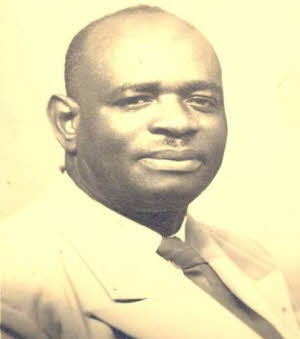
Ernest Dunstan Morgan being one
of the first to receive a druggist certificate ever issued in Sierra
Leone felt a need to serve his country. So he set up a small clinic in
Blama in the Southern Province of Sierra Leone. He then started trading
in Pharmaceuticals and General Merchandise in 1921.
After a successful practice in Blama, E.D. Morgan moved back to
Freetown in 1944 where he founded West End Pharmacy. The company
grew to become one of the largest suppliers of pharmaceuticals in West
Africa.
He subsequently changed the name to Morgan Pharmacies for which he was
the sole proprietor. "Morgan's" as it was locally and fondly
known became a limited company in 1962 with the late Sir Ernest as the
principal shareholder. The company established its head office and main
store at 64 Siaka Stevens Street (then Westmoreland Street) in Freetown.
The company continued to grow and became one of the largest employers
in the private sector in Sierra Leone. The share base was expanded in
1967. At the height of its expansion Morgan Pharmacies operated
stores at nine different locations in Freetown and its environs plus a
store in Makeni which he donated to his brother.
True to his pioneering spirit, Sir Ernest through Morgan Pharmacies was
one of the first businesses to employ women in key positions in Sierra
Leone.
Sir Ernest established himself as sole distributor for major
pharmaceutical manufacturers such as Bengues & Co, Ciba Geigy,
Parke Davis, Warner Lambert, Avon Cosmetics, to name a few.
Morgan Pharmacies survived intact and grew after Sir Ernest's death in
1979. However through the mid eighties to its suspending operations in
this millennium, the company faced a steady decline through erosion of
profits by ever increasing operating costs, inflation, lack of foreign
currency for the procurement of drugs, admittedly slow and irresponsive
management, and the general recession and political malaise that faced
this West African nation during its 15 years of civil conflict.
During the era of Morgan Pharmacies, E.D. Morgan continued to practice
as a druggist and concurrently ran a successful dispensary (clinic) at
64B Siaka Stevens Street.
A veritable philanthropist, Pa Morgan as he was fondly known donated
his services and medicines to heal those less fortunate and unable to
afford medical care. Money was not an object if you were sick and
came to Pa Morgan.
His philanthropy was not limited to his medical profession. E.D.
Morgan was influential in founding The Sierra Leone School for the
Blind. He sent its first principal and Head Master to England to
study brail and helped to obtain the site and facility for the
establishment of the school. In his usual selflessness, he
donated the school and insisted that it be named after the then first
Prime Minister the late Sir Milton Margai who also humbly declined.
An avid reader and consumer of global affairs, he was a proponent for
education; Sir Ernest believed that sound education opened the door to
opportunities and possibilities and provided an enabling environment
for success and development.
He quietly provided scholarships for many Sierra Leoneans to study
abroad and locally and paid school fees for countless relatives and
friends including also education allowances for a few determined
students from neighboring countries. In fact two of his scholars,
one from Boys High School and one from Girls High School bear indelible
memory of him as they subsequently got married and established a
successful family through their common thread with Pa Morgan.
He effectively related to people of all ages, and socio-economic
background. He was renowned for his effortless demonstration of
humanity and empathy through his words and at work.
In keeping with his philanthropic view and his belief in education,
E.D. Morgan sold at an economical rate - the land and buildings that he
owned at Congo Cross to then Mayor Cummings John to establish what was
once Roosevelt Memorial School - now called Vine Memorial School.
This site was owned and established by Pa Morgan initially as a low
cost housing complex; but when the need arose to create a school for
girls in that vicinity, E.D. Morgan was first off the mark and easily
convinced to donate the site. In his usual humility, he preferred that
the school not be named after him.
As a nominated member of the Legislative Council (the governing body
during the Colonial era) of Sierra Leone: E.D. Morgan was a sound
orator and proponent for positive change; Changes which led to the
evolution and transformation of The Legislative Council into The First
Parliament of Sierra Leone; preceding independence. The likes of
Wallace-Johnson were inspired by the intelligent debates put forth by
E. D. Morgan.
To make a difference in the city of Freetown, he ran for city council
and was named Alderman for his ward. That was the extent of his
political experience other than representing Sierra Leone at the
International Labour Organization (ILO) conference in Geneva. The
work done at this conference was pioneering for establishing labor
standards internationally.
He was an advocate for fairness and justice in the work force and lived
this by paying all within his employ a decent wage relative to other
standards in Freetown.
Relating to standards, he conducted his life with exemplary integrity
and believed in being wholesome and forthright at all times. Sir Ernest
Dunstan Morgan always remarked “I have done nothing that I will ever be
ashamed of.” Quietly religious, his favorite hymn was – Through
the Love of God our Saviour - All will be well.
E.D. as he was called by his beloved wife belonged to several clubs and
organizations of repute in Sierra Leone and in the United Kingdom and
was in demand as guest speaker at many functions where he shared his
wisdom and intellect. He quietly donated of his time and money in the
establishment and support of numerous organizations including (together
with the late Sir Emile Luke) being founding member for The Freetown
Diner Club, Sierra Leone Rotary Club etc. During his short stint
in the Lodge, he rose to the rank of Free Mason and officiated at all
ceremonies.
He was a front page listing for Sierra Leone in the internationally
recognized ‘Who’s Who’ almanac of key individuals and personalities of
note.
Through all this he preferred on a Sunday afternoon to spend quiet time
with his family at his farm on Wilkinson Road. On these
occasions, he was simply Papa.
Papa - the loving father, husband, mentor, motivator, friend, history and story teller, and visionary.
Ernest Dunstan Morgan’s work would not go unnoticed. He was
awarded several accolades including being named Justice of the Peace,
called to the Order of The British Empire, named a Member of The
British Empire and was subsequently knighted by the Queen in March 1971
as Knight Commander of The British Empire. He was decorated
Doctor of Civil Law Honoris Causa by The University of Sierra Leone and
was one of the first recipients of The Order of Sierra Leone on the
establishment of The Republic of Sierra Leone.
On the day his knighthood was announced, all the news papers read Good
Morning Sir Ernest; E.D. Morgan Sir – that Easter morning.
Sir Ernest Dunstan Morgan Born November 17, 1896 passed on December 9, 1979 buried at King Tom Cemetery December 17, 1979.
(Courtesy Standard Times Press)
Egerton Maximilliano Fashole Luke: The Doctor who Doesn't Take Money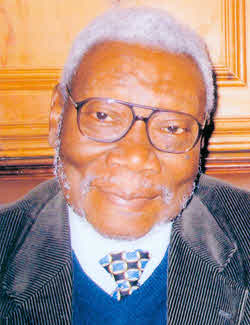
Egerton
Maximilliano Fashole Luke, eldest son of Sir Emile and Lady Sarah, born
on 30th May 1930, passed away on 24th September 2010 in Freetown,
Sierra Leone. During
school-days, he was renowned for riding everywhere at top-speed on a
bicycle without brakes. In youth was a keen sportsman, particularly
enjoying football; being nick-named "winter goalie", for donning a
turtle-neck to play. Challenged
by his mother, Egerton entered medical school in 1952. The first Sierra
Leonean admitted to the Royal College of Physicians, Edinburgh, by
examination in 1963, he returned home shortly afterwards, joining the
government medical-service. His first major assignment was up-grading
the Eastern Province to a specialist station. Responsibilities included
re-organising and up-grading all district primary healthcare-clinics
and supporting services; setting-up new under-fives clinics;
staff-training; and importantly, liaising with chiefs. Similar work
continued when transferred to the Southern Province. Egerton
relished the challenge of front-line, hands-on consultant-teaching when
transferred on promotion to the main-referral Connaught Hospital,
Freetown. Eschewing private-practice he treated all earning the
reputation of "that doctor who doesn't take money". Presidency
of the West African College of Physicians (WACP), 1999-2000, climaxed
his medical career. His goals (fulfilled within his lifetime) were,
commencement of reciprocity-negotiations with Edinburgh (his Alma
Mater); engagement in harmonization-discussions with sub-regional
Francophone physicians' associations towards full WACP membership;
computerization of WACP affairs; establishment of a prize in
psychiatry. Popular,
humorous, well-respected, passionate about life, he was always
principled. Supported by wife Elizabeth, their three sons and daughter,
Egerton made medicine his service and calling. Specialty: Internal Medicine
MB Durham 1957,
MRCP Edin 1963,
DTM&H,
FRCP Edin 1982
FWCP,
FCP SA
(Courtesy, Royal College of Physicians of Edinburgh)
Joseph Christian Adewole John - Regentonian John Adewole was a Sierra Leonean actor, musician
and performer known to his close friends and family as ‘Wole’. His
most recent dramatic incarnation was as the African genie on the Sky Aladdin
Broadband adverts.
He was born Joseph Christian Adewole John in 1948 in pre-independence
Sierra Leone where he was educated at the prestigious Sierra Leone Grammar
School and came to Britain in the late 1960s where he studied Theatre Arts at
Dartington College.

For the son of a middle class West African family where sons were expected to
become lawyers, doctors, accountants or academics, this display of interest
in the arts was in itself an act of rebellion against the prevailing status
quo.
He didn’t stop there, going on to have a
long-term affair in his twenties with his former economics teacher from the
Sierra Leone Grammar School. This caused a huge scandal at the time as his
teacher, Bianca Benjamin, was not only at least a decade older than he was,
she was also British and white.
Bianca, who passed away last year, also happened
to be my mother.
Their relationship really took off in North
London in the 1970s. Wole was effectively a stepfather to me and my twin
brothers for 5 years. He bought me a copy of War and Peace for my 13th
birthday and introduced me in my early teens to the works of André Gide and
Jean Paul Sartre. He encouraged me to discover poetry and to read it
aloud. He and Bianca were also very active in Sierra Leonean
post-independence political life, and both eventually became disullisoned
with the prevailing Sierra Leone APC (All People’s Congress Party) government
led by Dr Siaka Stevens.
In 1971, alongside other Sierra Leonean students,
they took over the Sierra Leone High Commission in London (the same building
at 33 Portland Place recently used for The King’s Speech) for 48
hours. I was with Wole when he bought the toy pistol in Muswell
Hill, North London that was used to hold up the High Commission security
guards. Wole, my mother and at least 5 other Sierra Leoneans went on trial at
the Old Bailey and were successfully defended by Sir Dingle Foot QC and
Desmond Da Silva (then a thrusting and extremely handsome young
barrister).
Their counterparts in Freetown were however not so lucky and twelve of them
were hanged for treason. Famously called ‘The trial of Mohammed Forna and the
11 others’, Forna’s daughter Aminatta, would go on to become the renowned
mixed race Sierra Leonean author of ‘The Devil Who Danced on the Water’.
Sadly, Wole and Bianca’s relationship did not
survive the Old Bailey trial and they spilt up.
Wole went on to specialise in acting and theatre development
appearing throughout the 80s and 90s in productions at the
National Theatre, The Lyceum Edinburgh, The Almeida, The Belgrade, Coventry,
The Old Vic, Birmingham Rep and The Gate.
Film and television appearances included Ultimate Force, Ali G, Escape from
Kampala and the BBC3 comedy series Little Miss Jocelyn.
He established himself as a formidable
storyteller, spinning African and Caribbean fables and epics as artistic
director of the Zuriya Theatre Company - a collective of storytellers who
performed in schools, youth clubs and community centres throughout the
UK. He was a fine musician who was a master of the congas, kabassa
and djembe. John Adewole died suddenly on Friday 18 February. He
leaves behind a wife with whom he had five children.
He is survivied by his two brothers, Olufemi John and Dan Joko John.
His funeral took place in Croydon, South London, Friday 25th February.
—————
John Adewole Filmography
and Biography includes:
The Omid Djalili Show (2007)
Little Miss Jocelyn (2006)
Ultimate Force (2002)
Ali G Indahouse (2002)
Deep Freeze (1999)
The Ebb-Tide (1998)
Brothers and Sisters (1998)
Welcome II the Terrordome (1995)
After the War (1989)
KYTV (1989)
The Play on One (1988)
The Bill (1984) (Written by Chantal Benjamin-Badgie)
|
Eric James: A Trail Blazer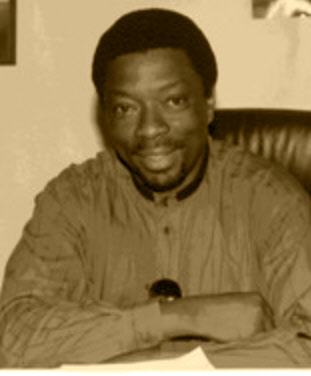
The sad passing away of Eric Eccles James, driving force of `James
International' Business Empire at the age of 64 certainly calls for eulogy. Yet
another warrior of the soil has gone down with the sunset but the dreams and
passions that moved them still flow on, continuing to motivate those who pick up
the mantle. Hence the need to chronicle their lives, what they stood for, the
vicissitudes of their earthly pathways.
Eric James was for many years a name that Sierra Leoneans equated with
economic business. James International was and still is a household trademark,
a business empire that spans at least three generations beginning in the early
forties with Eric's parents the late Horace Eccles James and Mama Princess
James.
In those formative years the family was involved principally in trade which
took the matriarch Mama James, into the depths of Sierra Leone's hinterland.
The family business was fanning out and Mama Princess James established business
outlets in Freetown, Koindu, Kissi Teng Chiefdom, Kailahun district, Yamandu,
Sandoh chiefdom, Kono district and in Macenta in the Republic of Guinea among
other places.
The family business saw the young Eric leaving the Sierra Leone Grammar
School for Macenta to assist his mother. This compelled him to continue his
schooling in that French speaking town. He became fluent in French.
What many younger Sierra Leoneans do not know was that Eric, the ace
businessman that he was, had for almost two decades cut a fine niche as an
international broadcaster.
His rich, trained voice was booming out from the portals of the British
Broadcasting Corporation (BBC) from 1967, a time when it was still a novelty to
see an African face at Bush House (the BBC's broadcasting house) or to find an
African cradling the microphone in far reaching programmes like Eric's, Post
Mark Africa. Those were the days of Pete Myers who was presenting the BBC
Morning Show which was the fore-runner of the current `Network Africa.'
Eric's `Post Mark Africa' programme was already touching the hearts of
millions in the emerging African countries that had won independence in often
grueling ways from their colonial masters. The new African was proud in
postulating his/her Africaness. The new identity that yelled out `I'm black,
I'm proud' resonated from President Kwame Nkrumah's Pan Africanist Ghana to
Sekou Toure's revolutionary Guinea to Abdel Nassers Egypt on to Emperor Haile
Selassie's Ethiopia.
It was the African Risorgimento (reawakening) that manifested itself in a
complexity of ways throughout the continent. It blended with the black
emancipation movements in the United States with the evocative philosophies of
Marcus Garvey, the spiritual emotive dream-force of Rev. Martin Luther King, the
radicalist stridency of Stokely Carmichael (Kwame Toure). Those fused with the
struggle to free Southern Africa, including Rhodesia (Zimbabwe), and then
Portuguese speaking Mozambique and Angola.
In such a powerful movement of Africans and people of African origin, Eric
James' `Post Mark Africa' was a chronicler of the age with the objectivity that
the BBC is famed for.
Eric's rich tenor voice sounded across the airwaves
as his fluid quick wit and pulsating diction easily won millions of new
listeners to the BBC throughout Africa. Post Mark Africa's presentation of
issues was middle-of-the-road in style - part serious part light hearted. It
grew in dimension and in listenership and in less than three years it was one of
the BBC's most popular African programmes, attracting listeners from all corners
of the continent.
But Eric had other and bigger ideas. He had got feelers from West
Germany's international radio; Radio Deutschewelle (Voice of Germany) that they
were expanding their African Service. Under its Director of the African
Service, the ever-driving Dieter Brauer, Deutschewelle was wooing big talents to
propel the vocal sounds coming from what was endearingly referred to as the
Grand Old City of Cologne. They had the resources and the sophisticated
equipment to entice the big names. They wanted Eric to do a breakfast show that
would hit Africa with a bang. Their terms were winnable.
Eric innovated his programme `The early birdies' and then the big one:
`Eric the Peril' show. With repeated scoops in global personalities being
interviewed in that morning programme, the Eric the peril show was a huge hit
from its very inception in 1969. At its height, Eric had earned a huge
reputation as a radio host, a disc jockey extraordinaire and as a promoter. He
promoted one of America's first musical megastars, `Isaac Hayes,' in the early
1970's, on Hayes' tour of West Germany and other parts of Europe.
Deutschewelle was rolling on. It had top of the line personalities: Ruth
Weiss, Nigeria's Peter Enahoro who was a journalist's own wordsmith, Sierra
Leone's David John etc.
Eric landed me the job of correspondent for the global programme `Window on
the world', which required my reporting and commenting on the news breaking
events in Sierra Leone.
And they were pretty heady enough: the 1970 assassination attempt on Siaka
Stevens by Brigadier Bangura and co, their trial and eventual execution; the
1973 attempt on Prime Minister Christian Kamara-Taylor's life; the trials of
Mohamed Forna, Ibrahim Taqi and others and their executions and a host of others
in the 1970s.
There were other aspects of Eric James that people did not know.
Considering that he hardly ever drove a vehicle in his later business years,
many would be astounded to learn that he was such a lover of fast cars that
while in Europe he revelled in racing speed cars though from an amateurish
perspective. It couldn't have been otherwise, a professional racing car driver
can hardly find time for extra involvement.
Eric met, courted and married the beautiful Helga, an indigene of Cologne.
She was also at Deutschewelle though she was more on the technical side. We
would sit in the twilight in Eric's flat at Grungurtelstrasse, working on
concepts while Helga pieced out things on the electric typewriter.
Eric James was an innovator through and through. He was at all times
brimming with mind blowing ideas of how Africa and particularly his own country,
Sierra Leone, should move on. Like many, he was aghast that Sierra Leone,
potentially one of the richest countries in terms of natural resources was still
in the list of poorest nations. His mother, Mama James, an ardent Christian who
would fly to Israel on religious maters, believed the problem was religious.
That Sierra Leoneans had turned their backs to the Almighty Creator who placed
all the bounties of the world in this territory to make it a paradise. Hence
the plummeting and the nose-dive.
Eric came home in the late 1980's to help make a difference. His flair for
innovation saw him, now as head of the James International company, flexing out
into pre-financing, agricultural produce on a large scale, mining, haulage,
penny-penny supermarkets, cash n carry shopping outlets, landed property
import/export, distillery etc.
The Eric James innovative flair was manifesting itself. At its height
James International was a multimillion dollar outflexing business empire that
could hold its own with many of its kind in the continent. The railway went, so
James International replaced the railway with some of the biggest haulage trucks
that the nation had ever seen, plying the routes, transporting raw and finished
goods every where.
The other siblings particularly, Tunde and Keddy, all took part in what was
intrinsically a family business. Eric's son, Eki, was also learning the family
business. Mama James had knit a close friendship with numerous chiefs and
elders in the provincial towns she did business with. Many were the children
who simply walked into the James household and stayed as family.
In one flow of his innovativeness Eric brought in one hundred (100) small
scale vans that he made available to farmers mostly in the Eastern province.
They were to pay for those in cash or kind.
The objective was that with mobility the farmers would be better able to
subscribe to the produce buying programme that `James International' was
pursuing. James International was at the time distilling gin, mining for
precious minerals and working on a ship building project, the ideas were
overflowing. It was a business empire that was Sierra Leonean and home grown -
a Sierra Leonean success story.
The eleven year rebel war took a cruel toll on the business. Much of the
company's investment was in the provinces. On many occasions, rebels ambushed
James International trucks and trailers while farmers were brutalized by
marauding gangs. Many vehicles were commandeered; mining sites were roughly
grabbed by the drugged rebel gangs. It was a huge disappointment for the man
who had put in so much, investing in his native land. "Typical", he told me
with a wry grin. But you could see he was deeply hurt.
"It's as if nature took all the bad people and put them in one country!" he
once told me after somebody he had trusted woefully let him down. Eric had so
many friends of various inclinations and his office saw a daily flow of press
people, business people, politicians, sports people and the like.
There were youths also who just wanted sponsorship for all sorts of ideas,
some weird indeed. Eric chatted, joked with them all and helped whom he could.
Before he had a terrible fall that partially affected his movements, he had
always been humorous with a quick wit. He was not averse to an evening cigar or
two with a glass of whisky.
"No more whisky?" I asked him one day after he had completed his daily
session with his physiotherapist. He gave me his infectious grin.
"Look, Ricky, I have to beat this thing. I must beat it".
Well, fate took over in a South Central Regional hospital in Petal,
Missisipi in the USA on 10th July, and Sierra Leone has lost a true patriot who
lived and breathed, yearning and moving for his country to emerge from its
slough of despond and become the beacon of light and progress that the good Lord
meant it to be.
(Tribute to Late Eric James: ADIEU ERIC `THE
PERIL'
Wednesday, July 29, 2009 - Arika Awuta-Coker)
Jeillo Edwards: Good-humoured cast matriarch on
television and BBC radio
Jeillo Edwards was an important figure in the history of black actors in
Britain. She was the first woman of African descent to study drama at the
Guildhall School of Music and Drama in London and one of the first black
actresses to be cast in a mainstream television drama series - Dixon of Dock
Green.
Jeillo Edwards, actress: born Freetown, Sierra Leone 23 September 1942;
married Edmund Clottey (two sons, one daughter); died London 2 July 2004.
Jeillo Edwards was an important figure in the history of black actors in
Britain. She was the first woman of African descent to study drama at the
Guildhall School of Music and Drama in London and one of the first black
actresses to be cast in a mainstream television drama series - Dixon of Dock
Green.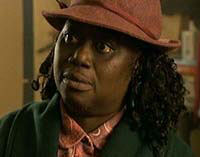
She was not a star, but rather a foot-soldier in the battle to entertain, of
over 40 years' standing. That she did not have the profile of Mona Hammond or
Norman Beaton was in part owing to her African origins (limiting the number
parts offered to her) and in part to an endearing shyness about her professional
career.
As a young radio drama producer working for the BBC, I met Edwards for the
first time in 1986. Preparing for my maiden production, I nervously ran through
the cast list with a fellow producer. "Oh if you've got Jeillo in the play
you'll be fine," he said. Edwards was short, pleasingly plump and gap-toothed -
a Sierra Leonean Wife of Bath. Her voice was loud and imperious, her phrasing
almost military in its precision. Her eyes were huge and beautiful. And my
friend was right. Angry young men with bruised ambitions became cheery lads in
her presence, brittle, glamorous and insecure actresses turned into the willing
daughters you always wanted.
Any cast was transformed into a family with Edwards in its midst as the
matriarch. She brought good timing, common sense, patience and delicious food to
the drama studio. A fantastic cook, she would show up for the initial
read-through with provisions of pepper sauce, chicken and akara (small
doughnuts) - always on time, usually a little early. Her good-humour was the
more remarkable because she uncomplainingly endured periods of bad health and
for six years was on dialysis.
One of six children, Jeillo Edwards was born in Freetown in 1942. She came
from a Krio family who valued education, hard work and English manners. Her
father was employed by the mighty United Africa Company as a buyer of
commodities - cocoa beans, cotton and palm kernels. Jeillo followed in her
mother's footsteps and was sent to the Annie Walsh Memorial School, one of the
oldest girls' schools in sub-Saharan Africa.
Her earliest memory of performance was as a child of four. Stepping in to
replace a nervous cousin in a church fund-raising concert, she read word perfect
from St Mark's Gospel, "Render unto Caesar the things that are Caesar's . .
."
She came to England as a teenager in the late 1950s, staying first with her
sister in Leeds then moving down to London to study drama at the Guildhall. Her
parents were not happy with her acting ambitions. Treading the boards was not
considered a respectable job in newly independent Sierra Leone, although her
mother had been a skilled storyteller, and the capital, Freetown, had a
considerable tradition of entertainment. It was in London in the early Seventies
that Jeillo met and married Edmund Clottey, a telecommunications engineer from
Ghana. Theirs was a long and happy marriage.
Jeillo Edwards Clottey was a realist but never a cynic. Being a black actor
in Britain is hard. Arguably attitudes and story-lines have improved a great
deal in the past 10 years, but in the 1970s and 1980s black actors faced a
relentless grind of often fruitless auditions, accepting small walk-ons or badly
written parts, where one's skin colour seemed to be the only point to one's
existence.
Edwards knew the score but never got grumpy. She gave up on having an agent
and took the line that, if they wanted her, she was free; and if they didn't -
well, her life was full of other interesting things to do. She was a devoted
wife, mother - of Victoria, Edmund Junior and Andrew, and to her nephew Alfred -
and grandmother; she was an active school governor, a keen church-goer and, in
her latter years, the highly acclaimed proprietor and chief chef of Auntie J's
in Brixton, a favourite eating place for young actors in between auditions. She
learnt to make wine and became so proficient she taught others.
She often found herself playing Caribbean women. One of the few outlets for
playing African roles was the BBC African Service's annual drama season. Plays
by writers as diverse as Wole Soyinka, Zakes Mda, Osman Nusairi, Bode Sowande
and Ben Ateku were performed with what amounted to a small informal rep of
African actors, including Willie Jonah, Yemi Ajibade, John Sorbah-Green. At the
centre was Jeillo Edwards.
Outside the cosy confines of Bush House's N41 drama studio, Edwards
accumulated a host of small and not-so-small roles in film and television. She
appeared in drama series including The Bill and Casualty. She was
memorable as the mother of the out-of-work dictator in Channel 4's In
Exile (1998) and the freed slave Mary Prince in the 1992 BBC2 drama
documentary A Skirt Through History (The Two Marys).
Her comic timing ensured her parts in a number of cult comedies including
Black Books, Red Dwarf, Absolutely Fabulous, The League
of Gentlemen and, recently, Little Britain. Her film credits embrace
a number of low- profile British films including Memoirs of a Survivor
(1981) with Julie Christie and Beautiful Thing (1996) with Meera Syal.
Her most recent film role was as a hospital cleaner in Dirty Pretty Things
(2002).
Her secret wish was to play a romantic lead, she said. She came close to it.
In Yusuf Audu Joe's Another Life, a radio play about the hardship of
being an actor in Nigeria, Edwards shocked and delighted with her portrayal of
an unscrupulous and outrageously sexy sugar-mummy. On the commercial front she
was a sweet old granny for the Royal Mail, while cinema-goers all over Britain
gloried in her shapely body in 1990 when Pepe Jeans imaginatively chose her over
the usual stick-thin models to promote their product.
(Fiona Ledger, Courtesy The Independent)
ARTHUR OSMAN FARQUHAR STUART: THE "PEOPLE'S DOCTOR", SIERRA LEONE
Among Sierra Leoneans and the wider West African community, Arthur Stuart was
known as "the leading physician of his generation." The weekly
magazine West Africa said that "in a country whose perverse
politics no longer treats people as people, Dr Stuart was first and
last the people's doctor." He came to England for his medical
training, going back to work in the remote parts of his beloved
country, and returned to England 10 years later to study at the
Liverpool School of Tropical Medicine. But he spent most of his life
and career in Sierra Leone's capital, Freetown, where he cared for
rich and poor alike. There he would probably have stayed if, a couple
of years after his retirement in 1995, the political and violent
unrest in Freetown had not forced him and his wife, Louie, to
flee.
In February 1996, after a number of rigged elections, Sierra Leone finally
had a free and fair one and the military leaders of a previous coup
were thrown out to live on their stolen millions. But as people were
at last beginning to appreciate the benefits of democracy, on 25 May
1997, they heard machine gun fire and the deep boom of grenades. The
army was back with another coup, but one that was far more violent
than before. Many who could fled the widespread looting, shooting,
rape, and the amputation of hands or legs, but Arthur Stuart remained
for several weeks until evacuated on 2 June in a pampam, a small
wooden boat. Having transferred to an old Lebanese tramp steamer, he
became the ship's doctor, treating women who fainted in the heat.
Having arrived in Guinea, he flew to Stansted, and sought asylum in
Manchester.
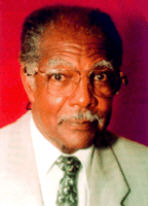 Arthur later wrote of his ordeal: "What a relief to be free of the soldiers
who would cut a pregnant woman's belly open to settle a bet whether
she was carrying a baby boy or a baby girl, amputate arms so that the
owners wouldn't be able to vote, burn down houses indiscriminately,
put a gun into children's mouths and threaten to shoot if they were
not given money and kill innocent bystanders with their
indiscriminate shooting." Arthur later wrote of his ordeal: "What a relief to be free of the soldiers
who would cut a pregnant woman's belly open to settle a bet whether
she was carrying a baby boy or a baby girl, amputate arms so that the
owners wouldn't be able to vote, burn down houses indiscriminately,
put a gun into children's mouths and threaten to shoot if they were
not given money and kill innocent bystanders with their
indiscriminate shooting."
Arthur Stuart was the first African to be posted to Sierra Leone's Hill
Station Hospital and later became consultant physician and head of
the department of internal medicine at the Connaught Hospital,
Freetown. He left the government medical service in 1972 to found a
much respected private practice. He was a foundation fellow of the
West African College of Physicians. In 1984, he was made an officer
of the Order of the Rokel of the Republic of Sierra Leone, the
country's highest accolade.
He had a wry smile and a strong sense of humour and he could bridge social
and cultural barriers with ease. He enjoyed house and beach parties,
and clubs and dances, and had a huge preference for good whisky. He
leaves Louie, and two children.
Arthur Osman Farquhar Stuart, former consultant physician Connaught
Hospital, Freetown, Sierra Leone (b Freetown 1927; q Manchester 1953;
OR, MRCP, DTM&H, FWACP), died on 13 March 2002 after a series of
strokes.
[Hugh T Fay E Luke
I B Amara.Courtesy BMJ Medical Journal]
THE
GREAT DR. OLOH; GUMBAY AND MILO JAZZ KING OF SIERRA LEONE
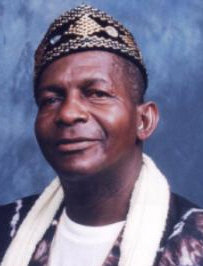
Olufemi
Cole, commonly known as Oloh, was born in the mountain village of Leicester
near Freetown on the 20th of March 1944. Born of humble parents, Dr. Oloh
never enjoyed the luxury of a secondary school education.
Due
to the limited financial resources of his parents, he was forced to leave
school at an early age to earn a living. He traipsed all over Freetown
in search of those houses where musicians used to practice. It was clear
that Oloh was looking for the opportunity to get into the music business.
He was always fascinated by the maestro and guitarist, Dr. Dynamite (Masokoloko).
His influence on Oloh was profound. At that point in his life, he was toying
with the idea of becoming a priest. But his weak educational background
hampered him and he quickly abandoned his ambition of becoming a priest.
Oloh then switched to music and discovered a niche in the market.
As they say, the rest is history.
Dr
Oloh discovered that he could still preach to people through his music.
He organised his first group, comprising percussion instruments. He composed
and performed songs, which were relevant to the community. Oloh rapidly
became a household name.
At
the early age of 10, he started making music with empty milk cans and bottles.
His musical ingenuity and his unending desire to develop Sierra Leone’s
rich cultural heritage, forced him into the full-blown music scene. Oloh‘s
ambition was to blend the native Sierra Leonean music Caribbean and Latin
American musical influences. That was the birth of his internationally
famous ‘Milo Beat’. Although ‘Gumbay Beat’ had existed, Oloh saw the need
to blend both sounds in his repertoire. Oloh began gaining dominance after
he was invited to perform with the Creole music exponent and legend, Ebenezer
Calendar.
Oloh
was “awarded” a Doctorate Degree by a grateful Sierra Leonean community,
which was greatly impressed with his dedication and contribution to local
folk and popular music. Oloh continued to develop his musical genre, which
ultimately became known as ‘Milo Jazz’. Getting people out of their seats
on to the dance floor was an easy task for Oloh. His music was exciting
and electrifying. There were no steps or moves to learn. It was simply
a matter of responding to the beat.
That
was the new circuit of ravers that Oloh animated and musically helped to
de-colonise in the late Sixties and Seventies. Prior to that period, the
Creoles of Freetown remained in contact with their Africana roots through
‘Gumbay Music’. That music evolved during sojourns of their ancestors in
the West Indies, and they brought it back with them after surviving the
long period of enslavement.
Sierra
Leoneans did not only dance to the infectious beat of Milo Jazz, they also
accompanied him in the singing as well. It was no longer just the music
of a group of people afraid of losing their culture; it became the music
of the entire nation seeking to be reunited by its culture. Oloh had many
student musicians in his college and had the ability to supply an ensemble
for several engagements at the same time.
In
1989, Oloh was awarded the OR (Order of Rokel) by the Government of Sierra
Leone, during the Presidency of H.E. Joseph Saidu Momoh, for his musical
excellence and contribution to the national development of music and culture.
Dr.
Oloh had a large repertoire. Dr. Oloh and his Milo Jazz Band performed
for the first time outside Sierra Leone in 1991, when he was invited by
international music impresario Akie Deen to perform at the Sierra Showcase
Event at the prestigious Empire Ballrooms in Leicester Square, London.
In 1992 he travelled again to the United Kingdom on tour. In 1994 he performed
with other Sierra Leonean musicians at a benefit concert for the late musical
legend, S.E. Rogie. His last performance in London was in 1996 when he
performed at the Centenary Celebration of one of Sierra Leone’s heroes,
Bai Bureh.
Dr.
Oloh continued his musical career until his death after a short illness
in Freetown on the 13th of October 2007
(By
Akie Deen. Courtesy Standard Times)
ANIRU CONTEH: AN ICON IN
THE TREATMENT OF LASSA FEVER
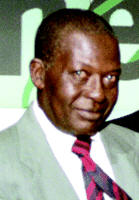
IWHEN REBEL forces overran
the town of Kenema in the Eastern Province of Sierra Leone, in February
1997 and then later in 1999, the government buildings were looted and burnt,
and most of the government workers fled before them. One exception was
the small outlying building beside Kenema Government Hospital. This is
the Lassa fever isolation ward - the only such specialist ward in the world,
presided over since 1991 by Dr Aniru Conteh.
The notoriety of this killer
disease ensured the ward's safety. The modesty of the building - its cement
floors are easy to sluice down, wide windows allow fresh air to circulate;
a small shelter has been built close by for the families of patients -
belies the international significance of the work carried out by Conteh's
team, who pursue their task in ever-present danger of the disease they
treat.
With the diamond mines of
Tongo to the north attracting migrant workers from across Africa, and waves
of rebels and refugees crossing and re-crossing the eastern border with
Liberia, stability has eluded Kenema for much of the last decade. Moreover
houses left derelict by the civil war in Sierra Leone have created ideal
breeding ground for the multimammate rat, which spreads the disease in
its urine. Food shortages have at times led people to trap the rats for
food, leading to further outbreaks.
Aniru Conteh spent most of
his professional life combating Lassa fever. It required great courage,
discipline and creativity to run such an isolation ward with severely tight
resources amidst such instability. He showed countless medical staff both
from abroad and in Sierra Leone what can be done in the face of hazards
and obstacles, and how patients could be given the best possible chance,
and how risks to their carers could be minimised.
Lassa fever is similar to
Ebola fever. Difficult to treat, with no reliable diagnostic test readily
available, highly infectious and with no reliable therapy or vaccine in
prospect, it starts with a high fever that within seven days can lead to
massive haemorrhaging, convulsions and often death. It takes its name from
a village in Nigeria where an outbreak of a mysterious fever in a mission
hospital in 1969 led to the three mission nurses' becoming infected. Two
died, but the third survived to be evacuated to America where the virus
was isolated at Yale University.
Following a new outbreak
of Lassa fever in the Catholic Missionary Hospital in Panguma, Sierra Leone,
in 1976, the American Joe McCormick, head of a team from the Center for
Disease Control in Atlanta, set up a research programme in Segbwema, Kenema
and Panguma. It was in Segbwema in 1979 that Conteh joined the CDC team.
Aniru Conteh was born up
in Jawi Folu, a tiny village near Daru in south- east Sierra Leone. His
father was a farmer and village chief. When Aniru was 16 his mother died
and he ran away from the local school to Freetown to fend for the family.
From school in Freetown he went on to study chemistry and biology at Fourah
Bay Colleges in Freetown, taking a Durham University BSc, and initially
became a teacher. In 1968, however, he enrolled as a medical student at
the University of Ibadan, Nigeria, qualifying in 1974, and working for
four years at Ibadan Teaching Hospital.
In 1979 he took up a post
at the Nixon Methodist Hospital in Segbwema, becoming Medical Superintendent
the following year, and with the outbreak of civil war in Sierra Leone
in 1991 the Lassa team, still with Conteh as its director, moved to Kenema.
Conteh was instrumental in
1996 in assisting Merlin, the London- based medical-relief organisation,
to establish a programme in Sierra Leone, which included support for the
Lassa isolation ward and Lassa fever control programme in the region. Throughout
the 10 years of war and the period of reconciliation that has followed
it he remained at his post treating thousands of cases and saving many
lives. His skill in diagnosis and treatment was unparalleled, and resulted
in a reduction in mortality of suspected Lassa fever cases to around 20
per cent.
Three years ago Conteh came
to Britain to present a paper on the management of Lassa fever to an international
conference on the disease hosted by the Central Public Health Laboratory
in Colindale. Last year he was again in London to mark Merlin's 10th anniversary
and to receive the "Spirit of Merlin" award for his international contribution
to the core mission of Merlin "to save lives and alleviate suffering".
He was an icon to Merlin's 1,400 relief workers worldwide.
Many of those who worked
with him went on to become leaders in the field of public health and infectious-disease
research. Dr Abdul Rahman Wurie, World Health Organisation Disease Prevention
and Control Adviser in Sierra Leone, saw the possibility of building on
the expertise of Conteh and his team to create a West African Regional
Centre for the treatment, control, training, emergency preparedness and
research into Lassa fever and, potentially, other haemorrhagic fevers -
a project awaiting realisation.
Despite the insecurity, the
lack of resources and opportunities to work internationally, Aniru Conteh
remained in Kenema ministering to those who needed his skills the most
urgently. On 17 March, while treating a patient, he accidentally pricked
himself with a needle and became infected. He died 18 days later.
Aniru Sahib Sahib Conteh,
physician: born Jawi Folu, Sierra Leone 6 August 1942; married (four sons,
two daughters); died Kenema, Sierra Leone 4 April 2004.
(Courtesy, Independent, The
(London), Apr 9, 2004, by Nicholas Mellor)
MRS ESTHER LILY COKER: A
TRAIL BLAZER
By Family Members
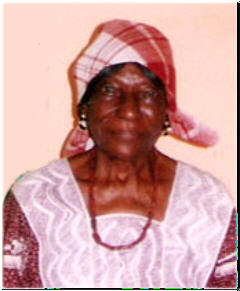
September 16, 1916 - February
18, 2007
The late Mrs. Esther Lily
Coker passed away on February 18th 2007 in Freetown and will be buried
on Thursday March 15th 2007. She was a woman of substance who blazed a
unique shining path in the art of leadership that many current and future
generations of Sierra Leonean women are going to be looking up to and striving
to emulate.
Esther Lily Coker died
at the ripe old age of 90 years. It was ninety years that were well lived
on earth with examples well set.
Born in Grand Bassam, Ivory
Coast on 16th September 1916, Esther Lily was the last of the six surviving
children of Ishmael and Naomi de WINTON DURING. She entered the Annie Walsh
Memorial School (AWMS) in 1929 after schooling from kindergarten to standard
Primary at the Government Model School and the Cathedral Girls School where
her elder sister Edna was a teacher.
She finished the AWMS as
the only pupil in Lower VI and as the Head Girl of the school. She then
went to Fourah Bay College where she did the Higher Teacher’s Course. On
finishing she returned to teach at the AWMS.
Esther was an ardent Girl
Guider. In 1930, whilst still at the AWMS she enrolled in the 1st Guide
Branch (1st Freetown Company) and worked her way from tenderfoot to 1st
Class Guide. In 1935, she became a ranger was subsequently appointed Lieutenant
and helped form a new Guide Company at the Freetown Secondary School for
Girls. She was one of 3 Girl Guides who represented the Sierra Leone Guide
Guides Association at the Coronation of King George VI in Great Britain.
In 1938 she got married to
Frederick Godfrey COKER and went to live with her husband in Northern Nigeria
till 1946 when the family returned to Freetown. By then Esther had four
children. For a short while thereafter, Mrs. Esther COKER was a part-time
teacher at the AWMS, teaching English and Geography. In 1947, she started
voluntary work with the Young Women’s Christian Association (YWCA) and
was selected to train as National General Secretary. Her training course
took her to Liberia, Ghana (Gold Coast), Nigeria and the UK. On completion
she worked for five years with Ms. Estelle AMARON of the Canadian YWCA.
Esther COKER then took over as the first National General Secretary of
the Sierra Leone YWCA, a post she held for 7 years. The ‘Y’ as the YWCA
was known, was struggling financially at this time and for the last 6 months,
YWCA could not afford to pay her a salary but she never relented in offering
her services.
In 1962, Mrs. Coker went
to work with the CARE School feeding project for 8 months. She was later
asked to help Rev. Warrity who was then Secretary General of The United
Christian Council (UCC) [now known as the CCSL]. Mrs. Coker’s services
were free and constituted part of the Anglican Church’s contribution to
the UCC. She later succeeded Rev. Warrity as General Secretary of UCC with
salary provided by the churches’ annual fees. This was minimal as not all
churches kept their pledge however she diligently held the post for 4 years.
As General Secretary of the
UCC, she coordinated the programmes of 13 denominations but some Heads
of Churches could barely tolerate a woman as head of the UCC. After a real
struggle, she succeeded in convincing the UCC to accept the United Church
Women’s organization (UCW) as the Women’s Wing of the UCC. Working with
UCW, she was for several years one of the coordinators of the Easter Dawn
Service held at 5:45a.m. every Easter Day in front of Battenburg Building.
As Secretary General of UCC,
she served on several committees of the All Africa Conference of Churches
(AACC) She became the first elected woman Vice-President of the AACC, and
served in that position for 2 terms (a total of 8 years). She served as
Chairman of the Refugee Committee and the Finance Committee of the Organization.
She was a member of the Christian
Peace Conference (CPC) in which capacity she interacted with members of
the Coptic and Orthodox Churches. She inaugurated the UCC Refugee Service
during the Biafra War and this Service worked with UNDP to care for refugees
from Namibia, Nigeria, South Africa and Zimbabwe. She negotiated with schools
in Freetown, in particular, to get them to accept refugee children into
their pupil population. She also served the children of Sierra Leone especially
on the Children’s Home Committee.
In the 1960s and 70s she
conducted Studio Morning Prayers over the Sierra Leone Broadcasting Service
(SLBS). She also participated in the popular SLBS Radio Discussion Programme
- Cabaslot en Kotoku.
Counting on her popularity
thus gained, in 1972, she contested but lost the Mountain Area Parliamentary
seat, an experience she could only describe as worrying.
In 1979, she entered The
Freetown City Council as representative for Freetown Central Ward 1. She
served for a one term period of 3 years and was in charge of Markets and
Social Services. This included Oversight of Cemeteries, School Recreational
Facilities, Thanksgiving Services, Paupers’ Aid and Christmas Treats for
the poor and school children.
In the 1980s she further
served her school (the AWMS) as Chairman of the Board of Governors.
From 1984-1986 she was one
of 12 people appointed by Government to serve on the Freetown City Council’s
Committee of Management under the Chairmanship of Alfred Akibo Betts. She
helped to organize the Bicentenary Celebrations of the Freetown Municipality.
She was amongst the first
set of ordained female Diocesan Lay Readers of the Anglican Church and
served on several committees of the Church of the Holy Trinity, the Anglican
Diocese of Sierra Leone and the Anglican Diocese of Freetown.
In 1999 when rebels burnt
down her house in Freetown, she went to the United States to stay with
her children for a while. There, she joined the choir of Walnut United
Methodist Church where she worshipped regularly.
She returned to Freetown
after the country had somewhat settled and passed away peacefully at the
ripe old age of 90 years on February 18th 2007 after having served her
country well. Her legacy, especially of blazing a path that showed that
women could successfully lead, is one of which current and future generations
of Sierra Leone women will look up to and emulate. May she rest in peace.
(Courtesy of Awareness Times
, Freetown)
BERTHAN MACAULAY QC: AN
INTELLECTUAL AND ADVOCATE
Berthan Macaulay, QC, was
born on November 12, 1929. He died on September 27, 2006, aged 76.
Born in Nigeria, Berthan
Macaulay devoted himself to promoting the rule of law in Sierra Leone during
the transition to independence.
In 1951 he came to England
where he read law and was called to the Bar at Gray’s Inn. His initial
career in private practice included three years in Foote’s chambers. Returning
to Sierra Leone with his family in 1957, he established the law firm Macaulay
& Co, with headquarters in Freetown. He built the most extensive and
up-to-date law library in the country.
He took silk in 1963 at the
age of 34, the first Sierra Leonean to do so. Later that year he was appointed
Attorney General by Sir Milton Margai, the first Prime Minister. But in
1967 the Government was overthrown, and Macauley was arrested and sentenced
to death along with 27 other key officials.
Incarcerated, awaiting execution
and denied access to his law books, Macaulay filed, argued and won several
grounds of appeal before a special appellate court. He ultimately won the
release of both himself and the others.
He was invited to relocate
by a number of Commonwealth countries, and he eventually took up residence
and later citizenship in Jamaica. There he remained active as a member
of the Eastern Caribbean Supreme Court.
(Courtesy Times Online)
BERTHAN
MACAULAY QC: A MAN FOR ALL SEASONS

A video tribute (Courtesy You Tube)
MACAULAY REMEMBERED AS AN
INTELLECTUAL AND ADVOCATE
By Kerry Mckatty
Berthan Macaulay QC's funeral
began with an Islamic prayer, followed by a Buddhist prayer then a Christian
service of thanksgiving. This order, said his cousin Prince Taylor-Lewis
in his remembrance, was reflective of Macaulay's beliefs and was done at
the departed lawyer's request.
"He found meaning in each
faith," Taylor-Lewis said, after relaying an engaging tale of young Macaulay's
failed confirmation in the Anglican Church because no one faith could sufficiently
convince him.
The service itself, held
yesterday at St Richard of Chichester Roman Catholic Church on Red Hills
Road in Kingston, was solemn.
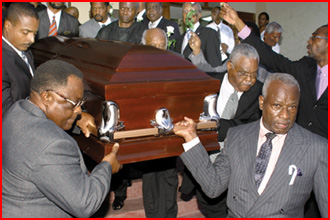
Pallbearers take the casket with the body of Berthan
Macaulay QC from the St Richard of Chichester Roman Catholic Church on
Red Hills Road in Kingston following a thanksgiving service for his life
yesterday afternoon. Macaulay died on September 27. (Photo: Karl McLarty)
There were no outbursts of
weeping, but it seemed every person in attendance understood Macaulay's
importance as a man and the value of his contributions to the legal profession
and life in general. Every remembrance of Macaulay painted a picture of
him as the consummate intellectual and advocate.
"He never resiled from taking
different or even unpopular positions as long as he thought they were right,"
John Leiba, president of the Jamaican Bar Association, said in his tribute.
"He was tensile in his advocacy
and determination," Leiba continued.
But David Muirhead QC in
his remembrance said Macaulay knew how to relax.
"He wasn't all work; he was
famous for his dinner parties," Murihead said. Muirhead spoke, too, of
Macaulay's "viper tongue", adding that the lawyer was a "fighter to the
core".
Berthan Macaulay moved to
Jamaica in 1974 from Sierra Leone, where he was that country's first native
attorney-general.
"And so Sierra Leone's great
loss became Jamaica's gain," Muirhead said, echoing Macaulay's cousin,
Justice Abdulai Conteh.
Muirhead's remembrance drew
to a close with a question that friends and family members tried to answer
in their tributes: "How, I ask, will we remember him?"
Macaulay, a well-respected
attorney, tried several landmark cases before the local and international
courts. He was 76 years old when he died and is survived by his wife, Margarette
Macaulay and six children.
(Courtesy Jaimaca Sunday
Observer staff reporter
Sunday, October 15, 2006)
TRIBUTE TO HONORABLE PC
MADAM ELLA KOBLO GULAMA
Madam Ella Koblo Gulama was
born on 26th January 1921 in Moyamba and was educated at the Harford School
for girls from 1928 to 1938. She then attended the Women Teachers Training
College at Wilberforce, Freetown from 1938 to 1941. After completing her
studies she was appointed supervising Teacher for the Provinces, the first
to attain this position.
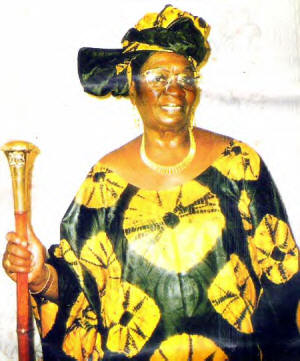
Late PC Ella Koblo Gulama
She was married to Paramount
Chief Bai Koblo Pathbana II Marampa Masimera Chiefdom, in 1944. The union
was blessed with seven children, two surviving, Obai and Soccoh and many
other Kabia children
Madam Gulama was born in
Moyamba Kaiyamba Chiefdom in Moyamba District. Her late grandfather Momoh
Gulama and father Julius Gulama were Paramount Chiefs of Kaiyamba Chiefdom.
Paramount Chief Julius Gulama
worked relentlessly to bring people of all ethnic groups together. He supported
and worked for the establishment of the BO Government School and was one
of the founding members of the SLPP. After his death in 1953, Madam Gulama
succeeded him as Paramount Chief of Kaiyamba Chiefdom.
She soon followed in the
foot steps of her father and entered national politics. In 1957, she became
a Member of the Moyamba District Council and was also elected to the House
of Representatives of Sierra Leone as Paramount Chief Member for Moyamba
District. Thus becoming the first female member of that august body. She
was re-elected to Parliament and appointed a Cabinet Minister in government
of Sir Milton Margai, Sierra Leone’s first Primer Minister, thus becoming
the first female minister in Sierra Leone and the sub-Saharan region.
In 1967 she regained her
seat in the General Elections. However the elections were marred by controversy
followed by a period of instability affecting the whole country, culminating
in a series of military coups that finally ushered in a thirty year period
of party rule under the APC. Earlier in this period, she spent two and
half years at the Pademba Road prisons but was subsequently exonerated
and released. She was also deposed as Paramount Chief during this period.
She remained in the service
of her church, the United Methodist Church, and from 1985 to 19901 she
was the Vice-President of its highest organ, the conference on Finance
and Administration.
Throughout the span of her
career, Madam Gulama maintained a high interest in educational development
in Sierra Leone. In particularly, she worked hard to promote the education
of girls and to improve the lot of women folks in this country. She was
a member of the Board of Governors of her Alma Mater, Harford School for
Girls in Moyamba. She was also member of the Sierra Leone government Scholarship
Advisory Board and also a member of the Bursary Committee of Fourah Bay
College.
She was President of the
Federation of Women’s Organisations in Sierra Leone from 1960 to 1967,
and President of the National Organization for Women (Sierra Leone) from
1985 to 1991.
In 1992, Madam Gulama had
a renaissance of her Political career, contesting and winning re-election
as Paramount Chief of Kaiyamba Chiefdom by a unanimous vote. She worked
assiduously with the help of NGOs to bring agricultural and infrastructural
development to her Chiefdom and district. The rebel war and its effects
were devastating to Moyamba District and the country as a whole, resulting
in complete setback to development and progress. She was forced to
leave Moyamba and seek refuge in Freetown.
On her return to Moyamba,
madam Gulama again put all her efforts into the rehabilitation of her Chiefdom
and District. She however suffered setbacks in relation to her health.
She served in various capacities as director of the Sierra Leone Export
Development and Investment Corporation (SLEDIC) from 1994 to 1996 and also
a director of The Sierra Leone Commercial Bank Limited
She travelled widely representing
our country in Africa, Europe, the United States and the Middle East. As
early as 1957, she was invited by United States Government Department of
States accompanied by her closed friend Mrs. Elizabeth Eula Hatib. She
completed a four month tour, during which time she met with the then Vice-President
Richard Nixon, and was also a guest at the NAACP convention in Cleveland,
Ohio and at the Booker T. Washington Institute of Tuskegee, Alabama. She
also visited the Lady Mayor in San Juan, Puerto Rico in 1964. She led the
Sierra Leone delegation to the World Fair in New York and introduced the
Sierra Leone national Dance Troupe to an international audience for
the first time with the late John Arkar. She also participated in a number
of UN-sponsored conferences on matters of rural community development and
female education and progress.
She was the recipient of
several awards including the MBE in 1959, the O.B.E in 1966 from Her Majesty
Queen Elizabeth and the Order of the Rokel Award from the President of
Sierra Leone, His Excellency Alhaji Dr. Ahmed Tejan Kabbah.
She adored her family and
friends and was a strong proponent of African traditional values.
(Courtesy of Awareness Times
, Freetown)
TRIBUTES TO BISHOP T. S. BANGURA
Bishop Thomas S. Bangura,
the second indigenous person elected United Methodist episcopal leader
of Sierra Leone, died Sept. 24.
Bangura, 81, began his ministry
in the Evangelical United Brethren Church and served as bishop from 1979
to 1992.
He died within one day of
the anniversary of the Sept. 25, 2005, burial of his wife, Regina. The
funeral service is scheduled for Oct. 8 at King Memorial United Methodist
Church, Freetown, Sierra Leone.
According to Sam Bangura,
his son, the bishop said during his final days that he "was confident that
I will see God, whom I have served so well here on earth." Bangura described
his father as "a man of deep faith," and in requesting that news of his
father's death be communicated to the United Methodist Council of Bishops,
he said, "May his soul rest in peace."
The Sierra Leone Annual Conference
was established in 1973 under Bangura's leadership. The first indigenous
bishop of the conference was Benjamin A. Carew who served until retiring
in 1978. When Carew retired, Bangura was elected bishop in 1979 and the
conference became a part of the West Africa Central Conference in 1981.
It has been led by Bishop Joseph C. Humper since 1992. Humper is also indigenous
to Sierra Leone.
Responding to his predecessor's
death, Humper said "everybody knew Bishop Bangura to be a committed minister
and church leader. He was well respected by the community." In recognition
of the high regard in which Bangura was held, all the church leaders within
the Council of Churches in Sierra Leone are planning to attend the funeral,
Humper said.
?Bishop Bangura was a true
servant of God. He was a friend of the poor and a man of great compassion,?
said Bishop Janice Riggle Huie, president of the United Methodist Council
of Bishops and leader of the church?s Houston Area. ?Through the office
of the bishop he extended Christ?s care to everyone, especially those who
were among the poor.?
Bangura pursued theological
training locally at Fourah Bay College, the first college for higher education
in West Africa. He came to the United States in 1950 and studied for a
year at United Theological Seminary before returning to Sierra Leone. He
was the pastor of churches in Moyamba, Yonibana and Magburka, and was superintendent
of the Yonibana District.
The United Methodist Church
in Sierra Leone today traces its history to 1855, when the Church of the
United Brethren in Christ began mission work there. More recently, the
country was plagued by a civil war that began in 1991, and a peace agreement
between the government and rebels was signed in July 1999.
Bangura received a bachelor's
degree in philosophy and education from the University of Akron and a master's
degree in education from Columbia University between 1959 and 1963. He
returned home to serve Price Memorial Church in Georgebrook and Baughman
Memorial Church in Brookfields, and taught at the United Methodist Taiama
Secondary School. In 1975, he became superintendent of the Western District
and in 1977 was assigned to King Memorial Church.
The United Methodist Church
in Sierra Leone has 94,000 members.
The Banguras had four children:
Thomas Opa, Jeneba Koni, Philip Sam and Ansumana; and two grandchildren:
Regina and Arthur Yaskey.
(Courtesy of United Methodist
News Service)
Bishop T.S. Bangura of the United Methodist Conference died on Sunday,
September 24th 2006. The death occurred at 4:10am at the Blue Shield hospital.
Bishop Bangura was known
for his strong, gentle leadership and for his gift of wisdom. This good
man and strong Bishop was rich in faith. Bishop Bangura was warm and compassionate.
He was a true servant of God. He believed that he did not come to be served
but to serve and give his life to redeem many people. He was a friend of
poor people whom he helped materially and spiritually. He 1oved and helped
his Pastors. He believed that in life everybody does better when everybody
does better.
His love for the Church
was certainly one of the hallmarks of his life. He served his God well.
He served the nation well. He had an enormous capacity for friendship.
His was a giving spirit characterized by countless acts of generosity.
He practiced forgiveness.
In his last Episcopal message
to the 112th session of the Sierra Leone Annual Conference of the United
Methodist Church, he stated that; 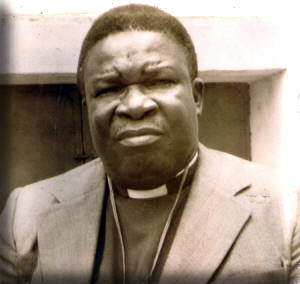
"No one is perfect. I wish
to openly apologize to anyone that I have offended, and if on the other
hand you offended me I would like to assure you of my forgiveness. May
the God of peace be with us now and for ever more".
He practiced what he preached.
Bishop Bangura received
his primary education at Ronieta and Rotifunk respectively. He entered
the Albert Academy in 1940 and received the school’s diploma in 1944. He
taught briefly at Yonibana and entered Fourah Bay College Ministerial Department
in 1946-48. He was ordained in 1951 and served as Pastor at Bradford, Moyamba,
Roruks, and Yonibana. He was awarded a year’s scholarship at the United
Theological Seminary in Dayton, Ohio in 1954. He returned home in 1955
and continued service at Yonibana and Magburaka up to 1958. He proceeded
to the United States for further studies in 1959. He entered the University
of Akron and graduated in 1963 with a Bachelor’s degree in Philosophy.
He gained admission at Columbia University in New York and received his
MA degree in Educational Administration. He returned home and taught at
the Taiama Secondary School when he was appointed Assistant Education Secretary
to the United Christian Council (UCC) and was later appointed Education
Secretary the following year, thereby becoming the first Sierra Leonean
to hold that position. While at the UCC he served as Pastor at Price Memorial
United Methodist Church and later at Bishop Baughman United Methodist Church.
He served the United Christian Council for 12 years and retired to become
Senior Pastor of King Memorial United Methodist Church and District Superintendent
for the Western Area. He served for five years and was elected the second
Bishop in Sierra Leone in 1979 - 1992, a position he held for thirteen
years. During his tenure as Bishop, he built over 12 schools and many churches.
In view of the outstanding service to the nation of Sierra Leone, he received
the insignia award of CRC (Commander of the Order of Rokel). He served
on many Boards of Governors of Secondary Schools and Teacher Colleges and
was later appointed a member of the court of the University of Sierra Leone.
He also joined the staff of the Theological Hall after his retirement in
1992.
He will also be remembered
for his great sense of humour - his stories will be told and retold across
the years. He was a National role model. He was married to Regina Bangura
(nee Taylor) for over 50 years and the union was blessed with four children
– Tom jr (Opa), Konie (Mrs. Jeneba Yaskey), Sam and Ansumana. He continues
to live in the hearts and memories of his family, and a multitude of his
friends and relatives. Let us rejoice in his life and his eternal victory.
(Courtesy of Awareness Times
, Freetown)
ALFRED AKIBO-BETTS: AN APPRECIATION
By Lansana Gberie 16/8/2006
Alfred Abraham Akibo-Betts,
who died last month in London , was an extraordinary politician – probably
the most patriotic and committed figure in Sierra Leone 's politics in
the last twenty-seven years or so. Various commentators since his death
have recalled – more in sadness than in anger – a few of unsavoury incidents
in which Akibo (as everyone called him) got himself involved in his early
(and extremely faltering) forays into politics. Everyone, however, agree
that Akibo soon after transcended those misjudgments, found immense gravitas,
and was so successful as a public figure (first by unearthing massive corruption
in government, and then by providing by far the most competent and effective
leadership of the Freetown municipality in living memory) that many rue
his failure (for he made an attempt) to become President of this badly
mismanaged Republic.
I first met Akibo when he
was Mayor of Freetown in 1993. In less than two years after becoming Mayor,
Akibo had transformed the once shambolic City Hall (for many years a haven,
like the crumbling City Hotel adjacent – famously Graham Greene's haunt
– for prostitutes) into an elegant neo-Georgian edifice. It was an immensely
delightful meeting: Akibo's sense of humour, his great ambition for his
city, his deep concern (somewhat barely discernible among many in the capital
then) for the war then ravaging parts of the country were striking. Months
later, Akibo's City Council donated tens of millions of leones towards
the government's – then the National Provisional Ruling Council, NPRC,
junta – war effort. It was easy then to deride this gesture (wasn't the
Mayor trying too hard to be in the good books of the junta? Surely the
city itself badly needed those funds?), but one can now only be nostalgic
about it: for the farthest that high-mindedness now go within City Hall
is for the current Mayor to seek newspaper headlines by grumbling aloud
about how paltry the sum is that the government allocates for the cleaning
of the streets facing his own office.
Akibo's tenure at City Hall
was memorable for two things: he was able to make Freetown reasonably clean
and clear major thoroughfares and streets of clogging market stalls; and
he was able to make the city solvent. Both of these achievements, taken
for granted while Akibo's tenure lasted, can now seem like outlandish dreams.
The idea of the colourful, charismatic politician is not always reassuring;
but Akibo was able to combine magnetism with great humility: a lover of
the spotlight (he assiduously wooed the media), Akibo nevertheless was
always self-deprecating. I don't remember him speaking out of turns: and
this is remarkable for such an outspoken and articulate politician with
such strong views. I think in the end he enraged the current government
by his well-timed, occasional criticism of the paralysis which has passed
for government for some years now.
During the gruesome
rebel attacks on Freetown in January 1999, Akibo's property in downtown
Freetown was destroyed, and he was nearly killed. The war left him a broken
man; but till the end he maintained a high spirit and a strong belief that
some form of national resurgence was still possible. When I went to Freetown
a few months after the attacks, I visited Akibo in his offices – or what
passed for an office: a little cramped building with a large desk and several
chairs, the only one surviving in the compound – on Bathurst Street . He
had painted a sign in front of the building reading “Sierracratic Commonsense
Salvation…” There was a touch of self-parody, never mind pathos, about
it all; about this great man of grandeur reduced to affecting a sense of
high-purpose and resurgence in this shrunken, blighted little edifice with
no money and no following.
I spent an hour with him,
for most of the time drinking beer and chatting about old days and the
great tribulations that the country had gone through. Akibo's memorable
old aphorisms enlivened the discussion: the slightly inapt ambience made
them sound like some old recordings from a remote, more blissful past.
“Our altitude is our attitude,” he would say. I understood him to mean
that Sierra Leone can aspire and reach any height once its citizens adopt
the right attitude towards their nation. He spoke about his loss and personal
suffering and humiliation with no bitterness, only sadness.
I next met Akibo a few years
later, in his house on Spur Road . He had been partially paralyzed by stroke,
and was confined home – a modest house which now seem near-derelict – in
pain, overwhelmed by memories of loss and abandonment. He spoke – in sadness
as well as some bitterness – of his unrequited life-long sacrifice for
the country. He had not made money in his long life in public office; he
did not have money to be taken out of the country for treatment. The government,
because Abiko was associated with the opposition All Peoples Congress (APC)
and had been critical, did not care about him.
The public that he had served
so selflessly did not appear to care either. He pointed this out to me
as a lesson: this is a nation that does not reward honesty and selflessness;
this is a nation that punishes its distinguished citizens. It is the prime
problem of Sierra Leone , he said. He was being philosophical: the words,
spoken deliberately, were a searing commentary and a warning. I was very
touched. With me at the time were my good friends Kingsley Lington, David
Tam-Baryoh, Isaac Massaquoi and Mohamed Swaray. After our meeting with
Akibo, we made frantic efforts to enlist the help of a few highly-placed
government officials, pleading on behalf of Akibo. We hit a wall. We felt
helpless. Akibo showed us mementos of glorious days: medals and awards
he had received from other Mayors and dignitaries abroad, invitations,
pictures with other Mayors, pictures showing Akibo holding the key to a
US city, mementos of Akibo's work to twin Freetown with cities like Hull
(in the UK) and many others.
He had grand ideas and dreams
for his historic city, thinking it comparable in grandeur, if not wealth,
to any other historic city: Akibo towered above all the charming little
junkies whose idea of themselves as statesmen is their presumed ability
to attract external assistance. Sometime later, I was seated in a Sierra
Leone National Airlines flight from Freetown (going to London ) when one
of the air hostesses came over to me and told me somebody wanted to talk
to me. I followed her to a corner where a man was crouched alone on a seat
meant for two. It was Akibo. Some people of goodwill had volunteered to
pay his way to London for medical treatment, after many months of suffering.
We spoke for an hour or so. It was the last time we spoke. At Gatwick Airport,
as I was walking to catch the bus to Heathrow – to take a flight to Canada
– I heard a quick announcement on the PA system calling on the people who
had come to pick up Akibo at the airport to meet him at a counter…
I'll end where I began. Akibo
was an extraordinary man, both as a politician and as a human being. I
am singularly unsuited to writing an encomium, but I find that with someone
who sacrificed so much for his country, and who was so wretchedly abandoned
in the end, I can even find pleasure in being oleaginous. Few, if any,
Sierra Leonean politicians in recent memory can claim the moral high-ground,
the depth of patriotism and selflessness which Akibo exhibited. None identified
as clearly with the idea – all-too-inchoate – that Sierra Leone can rise
to become a self-sufficient, proud and honourable member of the community
of nations. Certainly none embodied this aspiration as completely as Akibo
did.
He lived all his life in
Sierra Leone , rising from humble background to becoming a much-admired
national figure. He was one of the few public figures in whom one cannot
detect, however one is desperate to look, any trace of that old, if understated,
national disease: sectarian or ‘tribal' alliance or consciousness. I see
Akibo (along with Hinga Norman, another selfless patriot who has been abandoned
and humiliated by the country) as a sterling national hero whose loss will
be missed for decades to come.
(Courtesy Concord Times,
Freetown)
TRIBUTES TO SAMUEL K. SESAY

To have been a friend, supervisor
and co-worker of Samuel was one of my greatest privileges. He was a man
that could be trusted with details and responsibility. He was hardly
ruffled or distracted from his goals. I remember him as a loyal meticulous
and sincere person. One of Samuel's few faults was the inability
to say no to the call of duty, whether it was from his work or his Church.
Samuel was invited to the
EFSL staff team during the pioneering days of the Evangelical Fellowship
of Sierra Leone, when the only attraction for anyone to come on staff was
either faith or insanity. He was a man of faith. Together we translated
vision into concrete realities. Apart from his family, Samuel's lasting
legacies will include the many thousands of lives in Sierra Leone
he helped improve in the last sixteen years, especially during the dismal
chapter of the civil war.
Samuel was key to the success
of the following programs than many Sierra Leoneans will remember.
- The Emergency Relief Assistance
in the Western Area to help people stabilize after the rebel invasion of
Freetown
- Preventive health care
program in the Western Area and Bo.
- Lead management and service
delivery to Clay Factory Displaced Camp, home of some 8000 war displaced
persons.
- Consultative workshops
- Capacity building programs
for EFSL member bodies
- Farming program for 80
displaced farming families in Campbell Town
- Operation Christmas Child
- Shelter Construction at
Waterloo for people who lost their homes during the war
- Bread of Life Micro-Enterprize
Program that benefited some 3000 Western Are residents.
I can go on and on, but the
fact remains that we have lost a great person. Samuel has died..... but
he is not dead, because he lived for a purpose, and he died in the Lord.
His life like a star will
shine forever.
Crispin R. Cole
SAM'S JOURNEY TO GLORY
I first met Samuel Sesay
(fondly called SKS) in Lunsar in 1983. It was my first year of work at
the Baptist Eye Clinic and SKS had come to the hospital from Njala, where
he was a student and needed eye examination. An uncle of mine had referred
him to me for accommodation overnight as he arrived in Lunsar in the evening.
We got bonded to each other when I pleasantly discovered that SKS was a
member and one of the leaders of the VCU, the Christian union at Njala,
a sister fellowship of the BSU at Fourah Bay College where I had been president
in the previous year. We meet again in Freetown in the late 80s. This time
we were both associates of SLEFES and Sam and I served on the constitution
committee for the establishment of that harm of SLEFES.
When the EFSL secretariat
was established in 1989, the then General Secretary, Brother Crispin Cole
was looking for people who could serve in the secretariat. When he approached
me, I did not feel called then to work for EFSL and recommended SKS instead.
Sam had just had a short stint at the FSSG and the then Barclays Bank and
was more than willing to join the EFSL team, one of the earliest on the
staff team. He started as a volunteer on the church survey research project
in 1990. Then he had a full time appointment as Administrative Assistant
later that year.
With the influx of refugees
from Liberia and the subsequent outbreak of the war in Sierra Leone, EFSL
felt the need to respond to the humanitarian crisis in the country. This
is how Sam became the pioneer of our now thriving Relief and Development
Department when he was appointed as the first Relief and Development Coordinator.
With restructuring in 1999 Sam moved on to yet another pioneering role
as Research, Planning and Programming Coordinator in 2000. In this role,
he assisted all the departments and member organizations of the EFSL in
proposal writing and project implementation. The latest role he played
was Operations Manager; again, the first to hold that position; which in
essence, was the nerve centre of all EFSL operations. He did not only have
a strategic role in the overall administration of EFSL but had role in
every single project implementation.
Over the period Sam had acquired
a wealth of knowledge from evangelism to organizational development. He
qualified as an OD Consultant, M. Sc in Rural Development only in the last
six months. He was a seasoned facilitator, exceptionally dedicated and
very submissive. He was very humble and self-less. Colleagues would remember
him for his sternness and uncompromising posture. This may have been a
nuance for some of us but no doubt this added value to our operations and
aided in achieving organizational objectives. Sam spent is active life
in the office on Circular Road and the church, Joy AG on Short Street.
He would never say ‘no’ to any assignment; and even though he always had
several subordinates, he would hardly pass on an assignment that was directly
assigned him. I must have told Sam umpteenth time that he did not have
to personally do this. He believed in his pen.
I hold the view that a glowing
tribute at a dear friend’s funeral should not be mere rhetoric to impress
listeners, but rather to endeavour to recall those conversations which
the departed must have heard from your lips. I had to dig out his personal
file to recount our appraisal dialogues. The last two of these went something
like this:
Appraiser’s comments: Sam
is a pillar of EFSL. Knowledge and commitment to the organization is a
great asset. You have done well over the years. Need to look for a significant
achievement. That is to say, you are successful in what you are doing.
But must now use all you have to go for something SIGNIFICANT.
Apraisee’s
reaction: I have noted the comments and the areas that I need to improve
on my lot and for the good of others. I shall do something about the areas
where I have scored ‘C’. (BY the way, ‘C’ is where he met the essential
requirements in the competency areas of assessment).
The following year and the
very last appraisal read like this:
Appraiser’s comment: Commitment
to organization exceptional. I hope new role as Operations Manager will
pose fresh challenges and performance will match this.
Apraisee’s
reaction: I agree with GS’ assessment of my performance and I have taken
note of the areas where I need to make improvement such as grasping opportunities,
initiative and effective leadership.
A new direction, we had agreed
on was to sell Sam’s services to other organizations. Recently, he was
given time off to try his hand at consultancy in partnership with Bro.
Nelson Clemens and EDRA Consultancy. The feedback from these partners was
excellent and very knowledgeable. In fact our first attempt was a proposal
to an international NGO but which has not seen the light of day.
Looking back at Sam’s life
I cannot but think he did his best to follow in the steps of his Lord and
Saviour; a life lived not just for self but more for others; a life of
paradox; the way of the cross. He had the opportunity and everything to
go for greener and greener pastures but always opted to serve the church
moved by the example of Christ his master:
He hungered but fed thousands
He was wearied but He is
the rest of them that are weary
He was heavy with sleep,
but he walked lightly over the sea
He prays but he hears prayers
He weeps but he causes tears
to cease
He asks where Lazarus was
laid for he was man; but he raises Lazarus for He was God.
He is sold, and for very
cheap, for it is only thirty pieces of silver; but he redeems the world.
As a sheep he was led to
the slaughter, but he is the shepherd of Israel and now of the whole world
also.
As a Lamb he is silent, yet
he is the word
He dies, but he gives life.
He descended so that he would
ascend.
Sam’s journey in this world
in so many ways was self-giving, indeed, the way of the Lord. Heaven is
paved with Gold; the way to heaven is not an easy one. Sam has weathered
the vicissitudes of this world and praise God he has now ascended into
glory to be with the Lord. Adieu Sam, I definitely have a sure hope of
meeting you again on the other side and this time eternally together with
the angels and in the presence of God. Rest in Peace.
AIAH FODAY-KHABENJE
GENERAL SECRETARY, EFSL
|
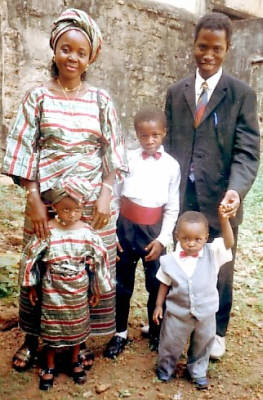 SINCERE
SADNESS SINCERE
SADNESS
Greetings Fatmata and Children-
With great sorrow
do I send my heartfelt loss of our dear brother and Board Member Samuel.
I am sure that you are wondering why so soon, why so quick when so much
seemed to be coming together for the family? One day we will ask
of Him this answer but for now you must carry on. Samuel made a great
impact on Sierra Leone. He was faithful to our God and to the children
and families of Sierra Leone.
May God bless you and keep
you my dear lady. All of our children extend their greetings and
remorse to you.
Sincerely,
Christopher and Debra Clark
Founders
Children of the Nations

WE HAVE LOST
A BRAIN IN SIERRA LEONE
My Dear Sister and the Children.
I want to on behalf of my
family extend our condolence to you and the Children for the loss of your
husband. It came to me as a surprise this morning when I was going through
my mails. Thank God for Brothers Crispin’s’ life and the use of the Sierra
connection.
We have indeed lost
a brain in Sierra Leone, Someone who is hard working trustworthy and always
willing to help. He was indeed a brother and one who loves the Lord an
asset to EFSL, and the body of Christ in Sierra Leone. Farewell me brother,
we will join you some day.
We share your thoughts Fatmata
for this great loss and we will continue praying for you.
Sister Theresa Bagrey and
Family.

SAMUEL KEWULAY SESAY- A
Brother, Colleague and Neighbor
The Late Samuel K. Sesay
('SKS' as he was fondly called) was a dear brother
in the Lord who was so committed
and loyal to the cause of Christ and his
Church that even when we
had to work late hours in the EFSL Secretariat, he
would not miss his church's
(Joy Assembly of God) night evening programs
(even if it meant attending
the last few minutes).
As a colleague in the
EFSL Secretariat, Sam was the man who served every
Departmental Head with wisdom
and devotion. He was the brain and developer
for numerous Project Proposals
which brought funding to every Department.
Yet he was very unassuming
and never took glory for this role. He would
often spend long hours in
the office just to meet deadlines for Project
submittal to donor agencies.
His commitment and loyalty to EFSL saw no
bounds. Even to the point
of missing a meal just to get a particular project
completed for that day.We
often joked in the office about having to 'remind
Sam of lunch time.' The
EFSL has lost a very formidable pillar. Sam's shoes
will be hard to fill.
My family and I had the privilege
of living in the same house with Sam, his
wife and three kids for
six months as refugees in Karporo, Guinea during the
1997 interregnum. I saw
Sam as a loving husband, and father to his three
kids. He sacrificed to ensure
his wife and kids stayed protected and
comfortable in Guinea while
he returned to serve in Sierra Leone during the
tumultuous years.
In 1999, Sam and my family shared a two-storey building
in the center of Freetown
till 2002. He was known in the neighborhood as,
"the quiet church man."
Fatty and the kids, we all
mourn with you at a time like this. Sam lived his
life for God, His Church
and his family. Now that he has gone to his Eternal
Resting Place, may
the God of Peace console us all and help you take care
of the kids.
Tom, Betty and the girls.
TRIBUTE TO CELEBRATE SAMUEL
SESAY
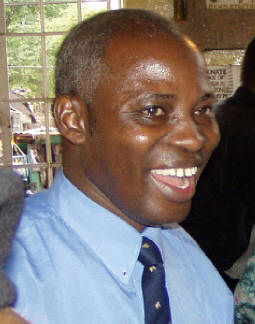 Samuel
was a dear personal family friend and co-laborer for the Kingdom of God.
My wife, Jeneba and our two daughters express our deep heartfelt loss to
Samuel’s dear wife Fatmata Helen and their children. Samuel
was a dear personal family friend and co-laborer for the Kingdom of God.
My wife, Jeneba and our two daughters express our deep heartfelt loss to
Samuel’s dear wife Fatmata Helen and their children.
We remember SKS as;
The Family we enjoyed
many blessed times with our wives, children, relatives and friends.
Church was central place
to worship God and serve the community in which Samuel and others moved.
EFSL- the contributions that
Samuel made to this body and beyond created a solid foundation for the
services they offer to the nations.
Children Of The Nations -bringing
Samuel to the national board gave the administrative and organizational
balance on the leadership team with clarity for the staff and children.
We mourn and weep with
you. May the grace of our Lord Jesus Christ continue to be your source
of strength, hope and comfort. We will never forget the work and
witness of Samuel. We will remember his faithfulness, consistency,
diligences, integrity, and perseverance in serving the Lord and people.
May the memories of
Samuel K. Sesay continue to inspire us love God, love another, and serve
everyone.
Rev. Augustine E.,
Jeneba, Angela and Catherine Davies
Sierra Leoneans in
Florida, USA.
IT IS WELL
Snatched
away by the sting of death,
Away
from us to answer a noble call
M
ourned by survivors having hope
U
seless is a life spent without Christ.
E
ternity is sure for SAM
L
iving to die no more is he
K
ewulay
your middle name friends hardly knew
Served
Christ with enthusiasm and zeal
Enter
now into the rest prepared for you
Servant
who was not ashamed to share the gospel of Christ
A
n adept teacher whose class non would like to miss
Y
ou are now in the welcoming hands of our savior.
Well
done good and faithful servant.
Brother Musa Daniel Sesay
(Seima)
TRIBUTES TO BARLIE S. KARGBO
Barlie Laid to Rest
TO MY DADDY
To my daddy, I love u now
and forever! Thanks for being there for us. I miss you so much...but I
am also filled with happiness. Happy that Jesus took you with him to the
place you talked so much about..Heaven! I remeber your last words to me!
And I will never forget the others!
Love you now and forever!
Your Daughter Raza
BARLIE S. KARGBO:
A BROTHER AND A FRIEND
As member of the Christian
family from Sierra Leone, West Africa, with my family, can testify to the
fact that God has blessed our family so much, having such a rich history
of serving and loving God. One of life's best has been taken away from
all of us and so suddenly, so soon. Barlie was a great testimony and a
true gentleman wherever he was.
I know you are missing him
very much, but he is in the place he spent his entire life preparing for
and helping others prepare for. I can just see him entering heaven and
God saying "Well done, thou good and faithful servant." We mourn
yet not as ones without hope. For we know that some day, one day, we will
all be reunited with our dear one (cf. 1 Corinthians 15:51 - 57). Barlie
S. Kargbo, a life truly worthy of celebration and perpetual memory!
To all the family members,
relatives and close friends, our very sincere condolences. Blessings, joy,
peace of mind and much more. Remember dear friends, that one day,
and it won't be that long; we will have a fantastic reunion like we have
never had before. We have so much to look forward to. But this doesn't
stop you from missing him now, and our prayers and condolences are with
each of you.
Peace,
Reverend Johnathan P. Decker
(Ph.D., DRH), and Family
Marion, Indiana
DEATH STRIKES AGAIN : BARLIE KARGBO IS GONE
Monday April 17 , 2006
Mr. Barlie S. Kargbo, a notable member of the Sierra Leone Christian Fellowship
, died yesterday at the Mercy Hospital in Philadelphia,
Pennsylvania. Barlie Kargbo is related to the Editor of COCORIOKO
by marriage. His elder brother , Mr. Morlai Kposongo Kargbo , of
Rokulan, Bombali District, was married to the first cousin of the Editor
, Kaday Sesay, who is now dead. Barlie came to the U.S in 1992
to pursue graduate studies and was brought by the Rev.
Billy K.Simbo to Faith Community Church in New Jersey ( A church
co-Pastored
by the Editor , Simbo and some other Sierra Leonean ministers in the early
1990s. There the Editor and Barlie met again for the first time since
1970 when they spent the long Rainy Season Vacation together at Rokulan
and Gbendembu.
Before his arrival in the U.S, Barlie Kargbo was Principal of a secondary
school in the Northern Province. He received his first degree at
Njala University College and studied for a Masters ' degree in Rural Development
in the U.S. His death is a big loss to friends, family and t
he Sierra Leone Scripture Union and Christian fellowship. May his soul
rest in peace.
By Rev Kabs Kanu
Courtesy Cocorioko
LUCY
VIOLET SYLVIA CAREW
Lucy
Violet Sylvia Carew, nee Macaulay February 6th 1939 - February 23rd 2006
aged
67 years.Her parents were the late Thomas B. O Macaulay fondly called Bob
of SL Post Office and Marampa Mines, and Standard Bank, and Eva Philippa
Sylvia
Macaulay,
Nee Fitzjohn of Harford School, FSSG and Marampa Mines.
She
acquired her basic education at the Ebenezer Methodist Primary School and
Freetown Secondary School for Girls. Her best subject was math.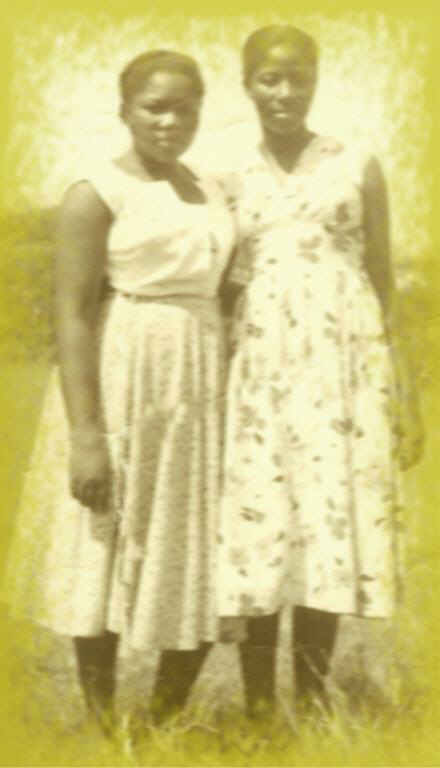
She
started her professional career in1957. She served humanity with compassion,
as a nurse at the Marampa Mines, and later at the Lahai Taylor Private
Clinic.
In
1961 Lucy fell in love and married the late Honourable Edward Carew, Member
of Parliament for Moyamba district. He was at the time a teacher at Methodist
Boys High School. Her love for human growth and development led her to
obtain a Teacher’s Certificate.
Lucy
touched hundreds of lives in the classrooms in Bo Town, Makeni, Moyamba,
Pujenhun, Kenema, Port Loko and Tonkolili districts, complimenting her
husband's tour of duty in the civil service. Lucy labored assiduously,
supplementing her teaching with business ventures.
They
finally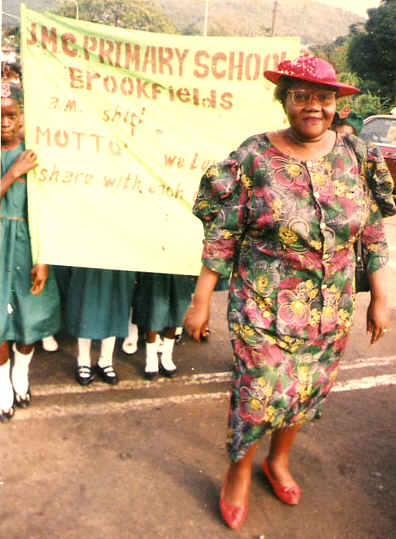
returned
to Freetown where Mr Carew retired as Deputy Secretary Ministry of
Health.
Lucy continued shaping young lives in the classroom in Freetown; at the
Buxton infant school followed by tenure at the Ebenezer Infant School and
UMC Primary School, Brookfields.
After
forty-two years, their marriage was terminated with the passing of her
husband in 2003. Upon retirement from active professional service, Lucy
found a niche in community development and church ministry. As Chair of
the Brookfields community development association, with the help of Plan
International she spearheaded the construction of the two storey Bishop
Baughman Memorial United Methodist Church Primary School in Brookfields.
Lucy
was also a very committed Christian worker. 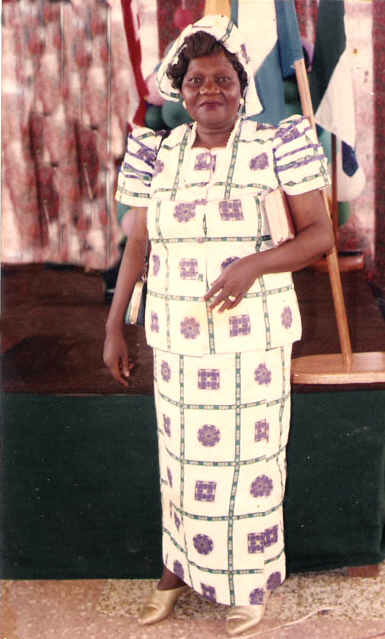
She
opened her home to the home cell that later was to become the Good News
Assemblies of God Church, now located in Bass street Brookfields. She was
also involved in the Living word of Faith Outreach Ministries International.
Mr
& Mrs Carew fled to Ghana during the military junta in SL. where her
daughter,
Emma and son live. Lucy answered her call to higher service in Ghana on
February 23, 2006 after a brief illness.
Like
tools in the hands of a craftsman, Lucy came to be used for a special mission.
Her mission accomplished, the mastercraftsman has promoted her to take
a rest in her mansion over the hill top. To God be the glory.
Miss
Me, But Let Me Go
Author
Unknown
When
I come to the end of the road,
and
the sun has set for me.
I
want no rites in a gloom-filled room.
Why
cry for a soul set free?
Miss
me a little—but not too long,
and
not with your head bowed low.
Remember
the love that was once shared.
Miss
me, but let me go.
For
this is a journey we all must take, and each must go alone.
It’s
all a part of the master’s plan, a step on the road to home.
When
you are lonely and sick of heart, go to the friends we know.
Bear
your sorrow in good deeds. Miss me, but let me go.
Tributes
I wish to thank you for forwarding me this Obituary. You may not be
aware who Mrs Lucy Carew is to me and the entire Mankobo conteh family
of 4 Lemon Lane.
Through you I wish to extend on behalf of the Mankobo Conteh family
our condolence to the Carew and Macurley families for the lost of our dear
Mother, Aunt, Sister and Friend .
May her soul rest in perfect peace
Mohamed Mankobo Conteh
4 Lemon Lane (Neighbour, Family Friend)
medconteh2005@yahoo.co.uk
CLIFFORD NELSON
FYLE, Father of Sierra Leone National Anthem
An
Appreciation: A Tribute by the Family
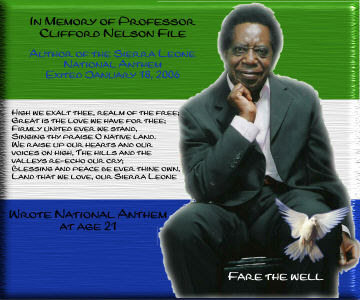
The distinguished linguist
and author Clifford Nelson Fyle, well known for writing the lyrics to the
Sierra Leone National Anthem, passed away on Wednesday, January 18, 2006.
Clifford was born in Freetown
on March 29, 1933. He attended Methodist Boys High School. Many would remember
him as their English teacher in the mid-1950s. At the age of 20, Clifford
obtained a Bachelor's degree in Languages, and also Mathematics from Fourah
Bay College, then under the University of Durham. After accomplishing a
Diploma in Education, he embarked on what would become a successful career
as an educationist.
Some of you may know that
he started his working life as a schoolteacher, but many of you may not
know that as a young man he was also a politician, indeed the first Publicity
Secretary and third in command, after Cyril Rogers-Wright and John Nelson-Williams,
of the United Progressive Party (UPP), which later merged with the SLPP
to form the Government of National Unity that led Sierra Leone to national
independence in 1961.
Clifford quickly found out
that there were many other ways in which he could serve his country other
than by being a politician. Regretfully, as he usually said, he gave up
politics, concentrated on education, and later became a storywriter.
He wrote the Bangurah-Cole stories which delighted thousands of readers
of the Sierra Leone Daily Mail in the mid-1950s.
Clifford obtained a Master
of Arts degree in Education in 1958 and a Bachelor's in English with honors
in 1960, both at the University of Durham, England. As soon as he returned
home in 1960, he entered the competition for the words of the Sierra Leone
National Anthem and won the competition with his High We Exalt Thee? verses.
He respectfully became the author of the Sierra Leone National Anthem.
In 1960, the Ministry of
Education appointed Clifford as an Education Officer and School Inspector,
the youngest School Inspector on record at that time. He was responsible
for acquiring textbooks for a number of schools in Sierra Leone. In 1964,
Clifford became a foundation staff member of Njala University College where
he was admired and greatly respected by faculty and students of this newly
opened University. He, however, was still determined to advance his knowledge
in Linguistics and, in 1967, he completed a postgraduate work in Linguistics
at the University of California at Los Angeles (UCLA).
Back in Sierra Leone, Clifford
became Senior Lecturer at Fourah Bay College where he attained his Professorship.
He was head of the Department of English and Dean of the Faculty of Arts
from 1977-78.
At this point, Professor
Clifford Fyle, the Master of Languages and English decided to have a change.
He was offered the Secretaryship of the West African Linguistic Society,
whose international Congress he had brilliantly organized at the Cape Sierra
Hotel in Freetown in 1974. Instead, Professor Fyle chose the wider international
sphere of UNESCO, where he accepted a job as Language Specialist in January
1978. Here, he ensured that all the 52 African countries were identified
and described, and their respective languages used for educational and
literacy teachings. In 1988, due to his exemplary work, he was appointed
World Coordinator of Mother Tongue Languages and Vice President of Research.
Professor Fyle also made
a strong imprint as a scholar in linguistics with the seminal Krio-English
Dictionary, which he co-authored with Professor Eldred Jones. The London
Times newspaper in 1980, was so impressed with the impact of his work that
it referred to this Dictionary as "blazing a worldwide trail" in modern
linguistic study and lexicography.
The Marquis Who
in the World publication recognized Professor Fyle's significant achievement
and had this to say about him: "Rising from lecturer (1964) to professor
and faculty dean (1977) Fyle revolutionized the teaching of languages within
the University of Sierra Leone. He scientifically established Sierra Leone's'
Lingua Franca, Krio, as a true Language. He also pioneered the establishment
of the Department of Linguistics and Sierra Leone Languages. At UNESCO,
he was responsible for the development of over 2000 Languages in 52 African
countries and their use in communication and education. His remarkable
success ensured his appointment (1988) as UNESCO's World Coordinator of
Mother Tongue Languages, as well as Vice President of the International
Association of research in Mother Tongue Education."
In 1993, Professor Fyle retired,
returned to Sierra Leone, brimful of energy and threw himself into his
heart's desire, that of producing school books in the major local languages
of Sierra Leone: Mende, Temne, Limba and Krio.
Throughout his career, Professor
Fyle produced and published 24 school textbooks and Readers which together
have established the teaching of these languages in Sierra Leone. While
he was in Sierra Leone, Professor Fyle started Lekon Publishing Company
in 1995. In 2000, he established a similar company in Yonkers, New York
as Lekon New Dimension Publishing. Through this company he published Sorie
Conteh's book The Diamonds which has become very popular among African
Studies Departments in most American Universities; and his last two novels,
These Old Colonial Hills? and The Alpha?. One of his earlier novels, Blood
Brothers, published by Longhorn Kenya Ltd, was nominated for the 1998 International
IMPAC Dublin Literary Award.
Apart from his outstanding
work for his country, and his numerous awards and public recognition, Professor
Fyle is most significantly remembered for three remarkable achievements.
- The first is as author
of the words of the Sierra Leone National Anthem; essentially, it is one
of the few National Anthems, if not the only one in all black Africa, of
which both the words and music were written by its national citizens.
- Second, Professor Fyle
wrote the grammar of the Krio Language and co-authored The Oxford Krio-English
Dictionary, an outstanding feat which proved to all Sierra Leoneans that
their everyday Krio was indeed a language in its own right, remarked the
Guardian newspaper of Britain when it was published. The Krio Dictionary
revolutionized the study of linguistics and Creole languages throughout
the entire world, ˜blazing a worldwide trail as described by the prestigious
British Newspaper, the London Times.
- Third, Professor Fyle made
history as the first Sierra Leonean to produce books for the teaching of
Sierra Leone languages in schools; six books each for Mende, Themne, Limba
and Krio representing the four national languages sanctioned by Government
for use in education. This achievement was considered in-achievable at
the time (1996-97) when these books were produced.
To Professor Fyle, as President
of the Sierra Leone Association for the Teaching of English in 1972, the
then Minister of Education Augustine Sandy remarked: Clifford, if even
you achieve nothing else in this life, at least you have made your own
contribution to Sierra Leone." Eleven years later, in 1983, the distinguished
British linguist Professor David Dalby expressed similar compliment to
Professor Fyle. In 2005, Professor Fyle experienced a deserving source
of pride. He was inducted into the prestigious Marquis, Who's Who in the
World, and Who's Who In America. Professor Fyle's biographical profile
is chronicled on the Marquis 2005 listings.
It was Professor Fyle's desire
to retire in his much-beloved homeland of Sierra Leone. Sadly, though,
he did so very briefly. Alas, the rebel war literally forced him out of
his country, and he moved, much against his will, to the United States
where he was destined for his last days.
Professor Fyle has left behind
a wife Rose Nelson-Fyle, seven children, and siblings including: Edith
Fyle-Cole, retired School Headmistress; Enid Fyle-Taylor, retired Accountant;
Clifton B. Fyle, an International Banker; Professor Cecil Magbailey Fyle
of Ohio State College (former Prof. at FBC); Hilton Fyle, former Broadcaster
SLBS and Ethline Fyle, Secretary in Sierra Leone. Professor Fyle is credited
for imposing strong academic structure and discipline to his siblings,
other family members and students.
Sierra Leone has indeed lost
a brilliant and dedicated son.
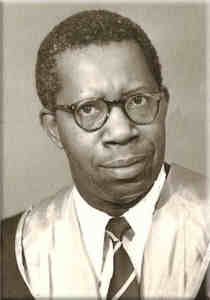
Thank you Professor Clifford
Nelson Fyle. May your soul rest in peace.
By: The Family
.
ABIOSEH NICOL, Sierra Leonean
diplomat and writer
ENCYCLOPAEDIA BRITANNICA
Year in Review 1994:
obituary
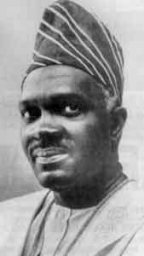 ABIOSEH
NICOL, Sierra Leonean diplomat and writer (b. Sept. 14, 1924, Freetown,
Sierra Leone--d.. Sept. 20, 1994, Cambridge, England), enjoyed a varied
career as a medical researcher, physician, academic, diplomat, and writer.
After attending the University of London, where he studied medicine, Nicol
earned a B.A. (1947) in natural science and doctorates in medicine and
biochemistry from Christ's College, Cambridge. There he conducted research
on the chemical structure of insulin in the human body and he wrote and
lectured widely on medical and scientific topics. In 1957 Nicol became
a fellow of Christ's College, the first black African to achieve this distinction.
Nicol returned to Sierra Leone in 1958 as a senior pathologist, but in
1960 he was appointed principal of the Fourah Bay College in Freetown,
a position he held for eight years. He began a distinguished diplomatic
career in 1969, when he was appointed Sierra Leone's ambassador to the
UN. In 1970 he became president of the UN Security Council, and he served
(1972-82) as executive director of the United Nations Institute for Training
and Research. From 1983 to 1987 he was president of the World Federation
of UN Associations. Nicol, writing under the pen name Abioseh Nicol,
won the 1952 Margaret ABIOSEH
NICOL, Sierra Leonean diplomat and writer (b. Sept. 14, 1924, Freetown,
Sierra Leone--d.. Sept. 20, 1994, Cambridge, England), enjoyed a varied
career as a medical researcher, physician, academic, diplomat, and writer.
After attending the University of London, where he studied medicine, Nicol
earned a B.A. (1947) in natural science and doctorates in medicine and
biochemistry from Christ's College, Cambridge. There he conducted research
on the chemical structure of insulin in the human body and he wrote and
lectured widely on medical and scientific topics. In 1957 Nicol became
a fellow of Christ's College, the first black African to achieve this distinction.
Nicol returned to Sierra Leone in 1958 as a senior pathologist, but in
1960 he was appointed principal of the Fourah Bay College in Freetown,
a position he held for eight years. He began a distinguished diplomatic
career in 1969, when he was appointed Sierra Leone's ambassador to the
UN. In 1970 he became president of the UN Security Council, and he served
(1972-82) as executive director of the United Nations Institute for Training
and Research. From 1983 to 1987 he was president of the World Federation
of UN Associations. Nicol, writing under the pen name Abioseh Nicol,
won the 1952 Margaret
Wrong Prize and Medal for
Literature in Africa. His works include Two African Tales (1965) , and
The Truly Married Woman, and Other Stories (1965). He edited Paths to Peace:
The UN Security Council and Its Presidency (1981) and co-edited Creative
Women in Changing Societies: A Quest for Alternatives (1982).
--------------------------------------------------------------------------------
Dr. Davidson Nicol was born
Sept. 14, 1924 in Freetown, Sierra Leone in Bathurst Village.
His full name was Davidson
Sylvester Hector Willoughby Nicol.
He was educated at
St. Cyprian School, Port Harcourt 1930 - 31,
Government Model School
1932-35,
Prince of Wales School 1935-42,
Christ's College Cambridge
1943-52.
--------------------------------------------------------------------------------
|





 Arthur later wrote of his ordeal: "What a relief to be free of the soldiers
who would cut a pregnant woman's belly open to settle a bet whether
she was carrying a baby boy or a baby girl, amputate arms so that the
owners wouldn't be able to vote, burn down houses indiscriminately,
put a gun into children's mouths and threaten to shoot if they were
not given money and kill innocent bystanders with their
indiscriminate shooting."
Arthur later wrote of his ordeal: "What a relief to be free of the soldiers
who would cut a pregnant woman's belly open to settle a bet whether
she was carrying a baby boy or a baby girl, amputate arms so that the
owners wouldn't be able to vote, burn down houses indiscriminately,
put a gun into children's mouths and threaten to shoot if they were
not given money and kill innocent bystanders with their
indiscriminate shooting." 








 SINCERE
SADNESS
SINCERE
SADNESS

 Samuel
was a dear personal family friend and co-laborer for the Kingdom of God.
My wife, Jeneba and our two daughters express our deep heartfelt loss to
Samuel’s dear wife Fatmata Helen and their children.
Samuel
was a dear personal family friend and co-laborer for the Kingdom of God.
My wife, Jeneba and our two daughters express our deep heartfelt loss to
Samuel’s dear wife Fatmata Helen and their children.






 ABIOSEH
NICOL, Sierra Leonean diplomat and writer (b. Sept. 14, 1924, Freetown,
Sierra Leone--d.. Sept. 20, 1994, Cambridge, England), enjoyed a varied
career as a medical researcher, physician, academic, diplomat, and writer.
After attending the University of London, where he studied medicine, Nicol
earned a B.A. (1947) in natural science and doctorates in medicine and
biochemistry from Christ's College, Cambridge. There he conducted research
on the chemical structure of insulin in the human body and he wrote and
lectured widely on medical and scientific topics. In 1957 Nicol became
a fellow of Christ's College, the first black African to achieve this distinction.
Nicol returned to Sierra Leone in 1958 as a senior pathologist, but in
1960 he was appointed principal of the Fourah Bay College in Freetown,
a position he held for eight years. He began a distinguished diplomatic
career in 1969, when he was appointed Sierra Leone's ambassador to the
UN. In 1970 he became president of the UN Security Council, and he served
(1972-82) as executive director of the United Nations Institute for Training
and Research. From 1983 to 1987 he was president of the World Federation
of UN Associations. Nicol, writing under the pen name Abioseh Nicol,
won the 1952 Margaret
ABIOSEH
NICOL, Sierra Leonean diplomat and writer (b. Sept. 14, 1924, Freetown,
Sierra Leone--d.. Sept. 20, 1994, Cambridge, England), enjoyed a varied
career as a medical researcher, physician, academic, diplomat, and writer.
After attending the University of London, where he studied medicine, Nicol
earned a B.A. (1947) in natural science and doctorates in medicine and
biochemistry from Christ's College, Cambridge. There he conducted research
on the chemical structure of insulin in the human body and he wrote and
lectured widely on medical and scientific topics. In 1957 Nicol became
a fellow of Christ's College, the first black African to achieve this distinction.
Nicol returned to Sierra Leone in 1958 as a senior pathologist, but in
1960 he was appointed principal of the Fourah Bay College in Freetown,
a position he held for eight years. He began a distinguished diplomatic
career in 1969, when he was appointed Sierra Leone's ambassador to the
UN. In 1970 he became president of the UN Security Council, and he served
(1972-82) as executive director of the United Nations Institute for Training
and Research. From 1983 to 1987 he was president of the World Federation
of UN Associations. Nicol, writing under the pen name Abioseh Nicol,
won the 1952 Margaret




